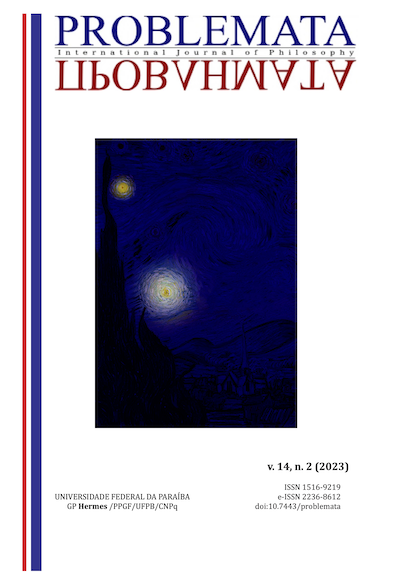WHO IS THE HERO IN THE MEDEA OF EURIPIDES?
DOI:
https://doi.org/10.7443/problemata.v14i2.67877Keywords:
Medea, Jason, Euripides, Aristotle, TragedyAbstract
This article aims to answer the following question: who is the hero of Euripides' Medea? This question, which guided our study, led us to analyze the characters of Medea and Jason, who we understand to be the highlights in the world of the tragedy that is now being examined. Aristotle's Poetics is the central philosophical text of our research, as soon as he seeks to point out a normative character to define what a tragedy is. Then, we move towards presenting some challenges to Aristotle's elaborations. Finally, we will build our own position on the meaning of the hero in the studied tragedy, seeking to consider the actions of Medea and Jason in the context of tragic destiny.
Downloads
References
ARISTÓFANES. As mulheres que celebram as Tesmofórias. Lisboa: Edições 70, 2001.
ARISTÓTELES. Poética. Lisboa: Calouste Gulbenkian, 2010.
ARISTÓTELES. Aristotle Poetics. Michigan: Ann Arbor Paperbacks, 2009.
ARISTÓTELES. Poética. São Paulo: Editora 34, 2015.
ARISTÓTELES. Ética a Nicômaco. São Paulo: Abril Cultural, 1979.
BACELAR, A. As medidas de um conceito: ocorrências de hýbris no Ájax de Sófocles. Clássica, Brasília, v. 19, n. 2, p. 234-244, 2006.
BUTCHER, S. H. Aristotle´s theory of poetry and fine arts. London: Macmillan and Co., 1932.
EURÍPIDES. Medeia. São Paulo: Ateliê Editorial, 2013.
HIRATA, F. A hamartia aristotélica e a tragédia grega. Anais de filosofia clássica, Rio de Janeiro, v. 2, n. 3, 2008, p. 83-96. Disponível em: https://edisciplinas.usp.br/pluginfile.php/5740385/mod_resource/content/1/hamart%C3%ADa.pdf. Acesso em: 25 nov. 2019.
HOMERO. Ilíada. São Paulo: Melhoramentos, 1962.
GRAVES, R. O grande livro dos mitos gregos. São Paulo: Ediouro, 2008.
JAEGER, W. Paideia: a formação do homem grego. São Paulo: Martins Fontes, 2010.
LA BARCA, C. A vida é um sonho. São Paulo: Hedra, 2008.
NUSSBAUM, M. C. A fragilidade da bondade. São Paulo: Martins Fontes, 2009.
OLIVEIRA, J. K. de. As funções do coro na comédia de Aristófanes. 2009. 259f. Tese (doutorado) – Universidade Estadual Paulista, Faculdade de Ciências e Letras de Araraquara, 2009. Disponível em: <http://hdl.handle.net/11449/102382>. Acesso em: 31 mai. 2022.
PAREYSON, L. Os problemas da estética. São Paulo: Martins Fontes, 2001.
ROMILLY, J. A tragédia grega. Lisboa: Edições 70, 2008.
SHERMAN, N. Hamartia and virtue. In: RORTY, A. O. (Org.) Essays on Aristotle’s Poetics. Princenton: Princenton University Press, 1992, p. 177-198.
SÓFOCLES. Rei Édipo. Lisboa: Edições 70, 2010.
SÓFOCLES. Ájax. Lisboa: Calouste Gulbenkian, 2013.
SZONDI, P. Ensaio sobre o trágico. Rio de Janeiro: Jorge Zahar, 2004.
Downloads
Published
Issue
Section
License
Copyright (c) 2023 Juliana Santana

This work is licensed under a Creative Commons Attribution 4.0 International License.
Authors who publish with this journal agree to the following terms:
- Authors retain copyright and grant the journal right of first publication with the work simultaneously licensed under a Creative Commons Attribution License that allows others to share the work with an acknowledgement of the work's authorship and initial publication in this journal.
- Authors are able to enter into separate, additional contractual arrangements for the non-exclusive distribution of the journal's published version of the work (e.g., post it to an institutional repository or publish it in a book), with an acknowledgement of its initial publication in this journal.
-
- Authors are permitted and encouraged to post their work online (e.g., in institutional repositories or on their website) prior to and during the submission process, as it can lead to productive exchanges, as well as earlier and greater citation of published work (See The Effect of Open Access).





